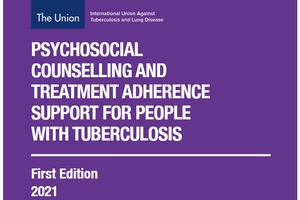Psychosocial counselling and treatment adherence support for people with TB
A new technical guide addresses critical gaps in TB care and control by focusing on overcoming the psychological, social and economic factors that prevent people from accessing diagnosis, adhering to care plans and successfully completing treatment.
The Union in partnership with TB Alert, WHO Regional Office for
Europe and the Stop TB Partnership today (14 April 2021)
released a new guide “Psychosocial counselling and
treatment adherence support for people with tuberculosis
(TB)”. This new Union guide on psychosocial support
addresses critical gaps in TB care and control by focusing on
overcoming the psychological, social and economic factors that
prevent people from accessing diagnosis, adhering to care plans
and successfully completing treatment.
Tuberculosis
is curable if the medications, which are often unpleasant, are
taken daily and uninterrupted over a course lasting six to 24
months. This pioneering manual provides the tools to support
affected individuals to complete this daunting and difficult
journey. "While it will be useful for clinicians, programme
managers and policy makers, I feel the manual’s primary
target is the trained health worker, social worker and care
worker who, together with their patient, can translate the
guidance into practice." said Prof Anthony Harries, Senior
Advisor with The Union and who provided medico-clinical inputs
for the guide.
The guide is co-authored by TB
Alert’s International Programme Director Sameer Sah and
Dr. Gill Craig, a psychologist with extensive experience of TB.
“The manual fulfils a huge knowledge gap among health and
care providers that is critical to achieve good treatment
outcomes for people with TB. It encourages and supports policy
makers to incorporate and promote psychosocial support as an
integral part of all TB programmes around the world.” said
Mike Mandelbaum, Chief Executive of TB Alert.
The TB
Psychosocial Support guide was supported by an international
reference group comprising TB survivors, members of multilateral
organisations, TB activists, academia, researchers and
representatives of civil society organizations working with
various TB key populations.
The guide can be
downloaded
here.
Source:
The Union


